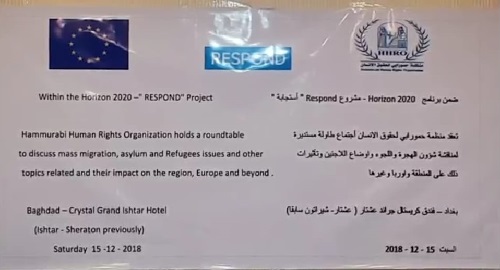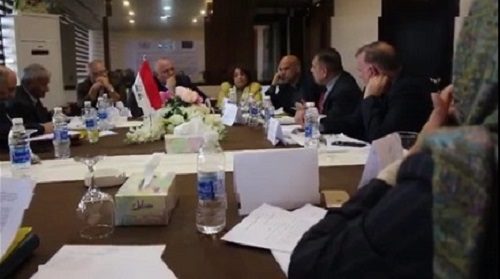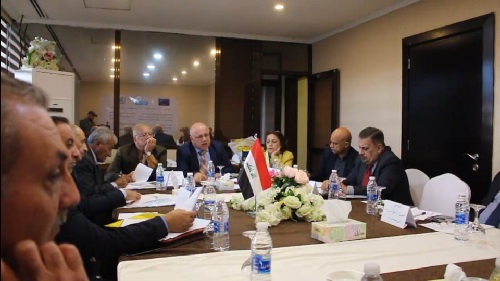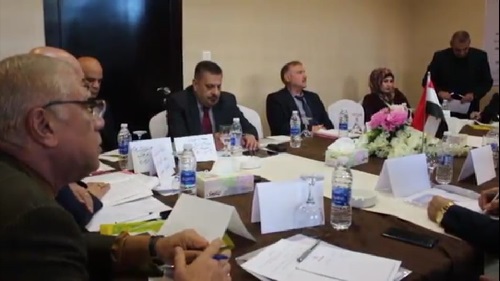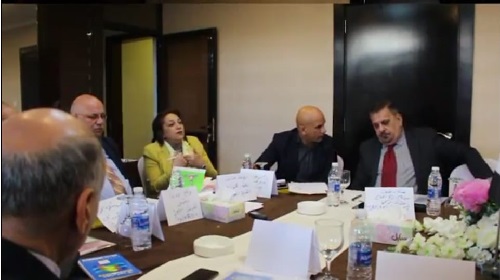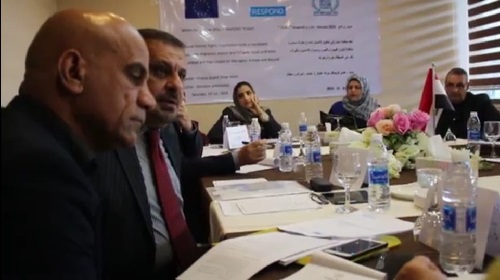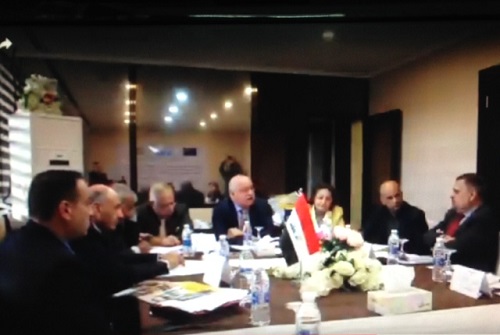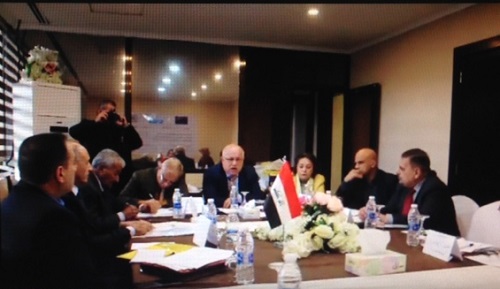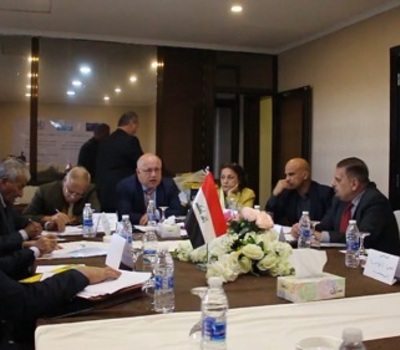
- Mr. William Warda, Public Relations Officer of the Organization, Head of the Iraqi Research Group to implement the "Respond" project administered the dialogue at the meeting
- Mr. Warda: The complexity situations of asylum and migration has led those concerned to search for easy solutions
- Discussions by participants focused on border management, immigration control, refugee protection , reception issues, and integration mechanisms
- Discussions sorted out criteria to serve the project of Respond
Hammurabi Human Rights Organization held a roundtable discussion on migration, asylum and refugee situations and its impact on the region, Europe and others. The discussion was held in Baghdad on 15/12/2018 and moderated by Mr. William Warda, Public Relations Officer of the Organization as part of the implementation of (Respond) Project on the study of mass migration and its impact on European countries and others, within a research alliance comprising (14) research institutions and that Hammurabi Human Rights Organization is part of this alliance along with academic research institutions led by Uppsala Swedish University and the British Universities of Cambridge and Glasgow, the Polish University of Warsaw, and other well-known European and Middle Eastern universities and research centers.
The meeting was attended by number of government specialists in the field of migration and refugees, as well as representatives of international organizations concerned with the follow-up and care of refugee rights, in addition to writers and journalists.
Mr. Warda welcomed the attendants and presented an accurate summary of the project, pointing out that is based on the governance of wise management of the issue of migration and asylum in the countries of origin and transit, as well as the countries of arrival, adding that no one chooses to resort to himself except under the circumstances that lead to migration,
adding that the issues of migration and asylum have become very complicated prompting stakeholders to adopt solutions and governance projects and when the International Convention on Asylum in 1951 was held, the number of refugees in the world was only 1 million, while the number of refugees, displaced persons and forcibly displaced is more than sixty five million citizens representing different continents Asia, Africa and South America.
Other facts of the two sessions of the roundtable was the discussion of border management and migration control as part of the questions:
Is Iraq's borders "open"? How do you describe your country's border policy? How to manage migration flows? What are the major developments and major changes (since 2011) in your country's border policy?
What institutions and social actors are involved in the implementation of border management and control policies?
How are legal provisions implemented? Does the application of EU provisions and domestic legal provisions differ from the legal framework?
What are the main types of cooperation and tension among actors involved in policy implementation?
As well as on refugee protection for the problems / obstacles as you see about existing refugee protection provisions in your country, such as access to the country concerned, access to asylum procedures, access to safe places, etc.? How is protection defined and formulated in national law? Safeguards (international, subsidiary, temporary or otherwise) If the answer is No, why?
What are the main themes / stories associated with "international protection"? (As a responsibility, as a right, a burden, an obstacle, a duty, aid, humanity, generosity, etc.). What are the major developments and major changes (since 2011) in your country's protection policy?
What institutions and social actors are involved in the implementation of international protection? What are the key issues and key patterns of cooperation and tension among them? How are legal provisions implemented? Is the application of the European Union and domestic legal provisions different from the legal framework?
What are the informal policies of protection? (NGOs and others).
Based on the experience of the stakeholders, is the current protection system in need of reform in Iraq? If so, in what way and how?
With regard to the issue of receiving refugees, questions were asked about the problems and obstacles regarding the current situation of receiving refugees in your country at the level of policies and practices, such as infrastructure, funding, legal provisions, preparedness, inclusiveness, etc. What are the key developments and milestones in national reception policies and regulations between 2011 and 2017 (and beyond, as important as this)?
Was there a significant political dispute between national, regional and / or municipal actors about the division of labor between 2011 and 2017 (and beyond, as important)? Does the multi-level system create operational obstacles for refugees to claim their rights (for example, because responsibilities are unclear)?.
Does reception quality vary across different levels?
What role have EU policy and legislation played in national reception policies and regulations?
How do women and men face the challenges of reception? What are the specific needs of women and men regarding reception policies? How do civil society groups and government agencies (addressing or failing) deal with gender issues (sex) in their work with migrants? Meet the needs of vulnerable groups such as unaccompanied minors, women, gay people and religious minorities. How and to what extent are the reception measures for these groups different from the usual procedure?
What are the publications on implementation - the main difficulties, any positive practices are highlighted.
Participants at the meeting stopped on the issue of integration in light of the problems / obstacles on the integration policy in your country towards the refugees? What is the understanding / narrative of the integration of asylum-seekers and refugees in your country?
How are integration policies implemented locally? Are there any local / regional differences? If so, how can they be interpreted? Are they coordinated by a specific ministry or department?
How are different levels coordinated? Do they respond to different political and social requirements? Do they homogenize or contradict each other?
What are the most difficult barriers to social acceptance / integration of asylum-seekers and refugees in this community / region / country? Please provide examples (what, when, where and how?).
On the labor market: What are the biggest obstacles for asylum seekers and refugees to enter the labor market and in the Territorial integration: What is the impact of the presence of asylum seekers and refugees in different territorial environments such as urban / rural areas; inside / outside refugee camps (ex. labor market, housing, education system, health care sector)?
And Iraq's experience in housing, what are the biggest obstacles to providing / accessing housing for asylum seekers and refugees in the (country)? What are the causes of these obstacles (ex. public discussions, housing shortage, etc...
As well as in education, what are the main challenges in the implementation of educational programs and measures for children and adults? How do you assess their effectiveness? Are they adapted to the labor market situation (do they respond to labor market needs)?
Mental health and public health, what are the biggest health concerns among refugees in meeting locally (primary care)? What are the obstacles you face and how do you deal with them? How effective are existing policies and programs in addressing these obstacles? Are there specific cultural and religious needs to effectively provide health care and social care services?
The meeting was videotaped to take advantage of this in setting standards that serve the objectives of Respond project.
